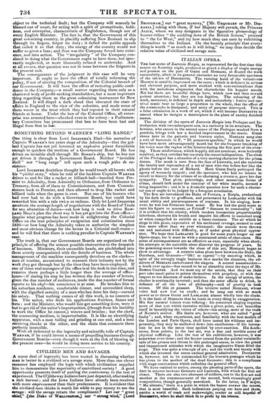SOMETHING BEYOND WARNER'S "LONG RANGE."
One thing is clear from Lord INGEsTRE's Iliad—his narrative of Captain WARNER'S ten years siege of the Admiralty—that the gal- lant Captain has not yet invented an explosive power formidable enough to quicken the motions of a Government Board. He has driven an invisible shell through Mr. &NEES'S ship, but he has not yet driven it through a Government Board. Neither "invisible shell" nor "long range" tell upon such a tough pace de re- sistance.
Lord INGESTRE doubtless thought he would touch all hearts with his "pitiful story," when be told of the luckless Captain WARNER driven to and fro like a racket or billiard-ball—bandied from Pre- mier to Admiralty, from Admiralty to Ordnance, from Ordnance to Treasury, from all of them to Commissioners, and from Commis- sioners back to Premier, and then allowed to drop like racket and billiard balls when the game is over. Not one of his hearers who had ever had to do with a Government Board, but could have rewarded him with a tale twice as tedious. Only let Lord INGESTRE ascertain the average length of negotiations with the Board of Trade for any alteration of duties—ask how long it took to drive Row- IAND Hue's plan the short way it has yet got into the Post-office- in. uire what progress has been made in enlightening the Colonial • ■■ ce on the true principles of emigration and colonization since I830—or how long the Admiralty takes to authorize the simplest and most obvious change for the better in a Colonial mail-route- and he will find that there is nothing peculiar in Captain WARNER'S case.
The truth is, that our Government Boards are organized on the principle of offering the utmost possible obstruction to the despatch of business. Ministers, their ostensible heads, are pitchforked into them utterly unacquainted with the details of business. The whole management of the machine consequently devolves on the clerks— men of routine, accustomed to measure their industry not by the work they get through but by the time they have been employed. If one of these real managers of the office is at his desk in due time, and remains there perhaps a little longer than the average of office- hours—if during his stay he has written the due number of letters, given the due number of audiences, made the due number of formal reports to his chef—his conscience is at ease. He betakes him to his suburban residence, comfortable dinner, and untroubled sleep, with the dignified serenity of a man who has done his duty—earned his salary. That nothing comes of all this work, is no concern of his. The suitor, who finds his applications fruitless, fumes and frets ; and the Minister, who would fain get something done, were it but to get rid of the suitor's importunities, (though from his inability to work the Office he cannot,) winces and bristles ; but the clerk, the connecting medium, is imperturbable. It is like an electrifying apparatus, with a man toiling and grinding at one end, and a man receiving shocks at the other, and the chain that connects them perfectly insensible.
With all deference to the ingenuity and scientific toils of Captain WARNER, if he could invent a means of propelling business through Government Boards—even though it were at the risk of blowing up the present ones—he would be doing more service to his country.


























 Previous page
Previous page